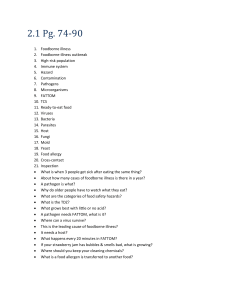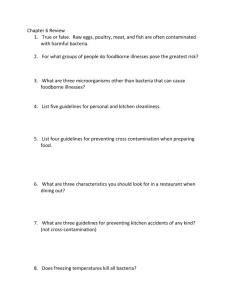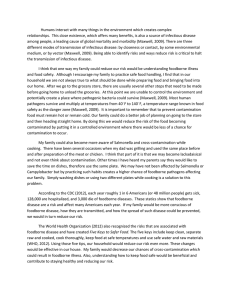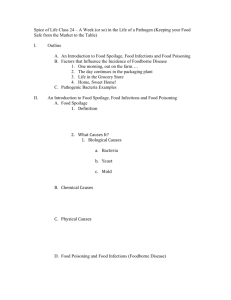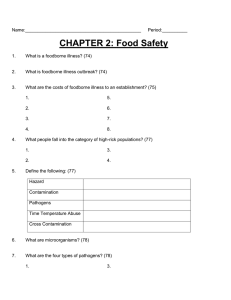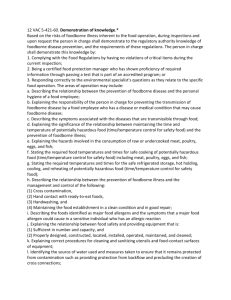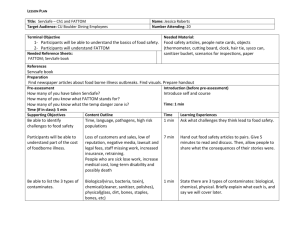Advancing food safety initiatives SIXTY-THIRD WORLD HEALTH ASSEMBLY WHA63.3
advertisement
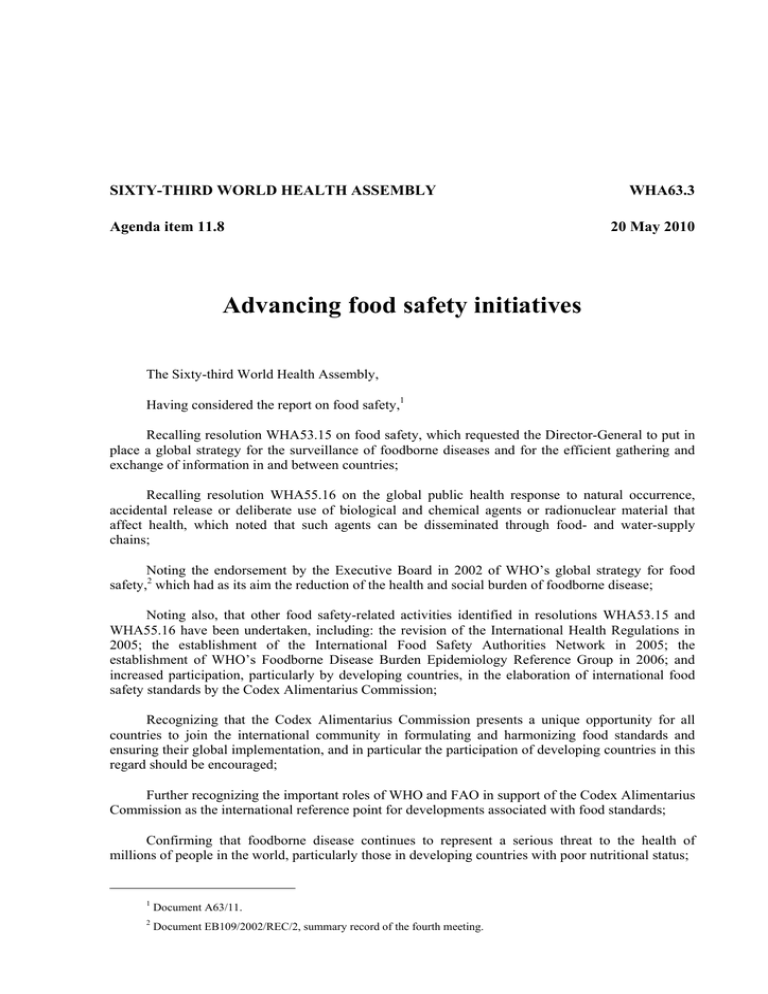
SIXTY-THIRD WORLD HEALTH ASSEMBLY Agenda item 11.8 WHA63.3 20 May 2010 Advancing food safety initiatives The Sixty-third World Health Assembly, Having considered the report on food safety,1 Recalling resolution WHA53.15 on food safety, which requested the Director-General to put in place a global strategy for the surveillance of foodborne diseases and for the efficient gathering and exchange of information in and between countries; Recalling resolution WHA55.16 on the global public health response to natural occurrence, accidental release or deliberate use of biological and chemical agents or radionuclear material that affect health, which noted that such agents can be disseminated through food- and water-supply chains; Noting the endorsement by the Executive Board in 2002 of WHO’s global strategy for food safety,2 which had as its aim the reduction of the health and social burden of foodborne disease; Noting also, that other food safety-related activities identified in resolutions WHA53.15 and WHA55.16 have been undertaken, including: the revision of the International Health Regulations in 2005; the establishment of the International Food Safety Authorities Network in 2005; the establishment of WHO’s Foodborne Disease Burden Epidemiology Reference Group in 2006; and increased participation, particularly by developing countries, in the elaboration of international food safety standards by the Codex Alimentarius Commission; Recognizing that the Codex Alimentarius Commission presents a unique opportunity for all countries to join the international community in formulating and harmonizing food standards and ensuring their global implementation, and in particular the participation of developing countries in this regard should be encouraged; Further recognizing the important roles of WHO and FAO in support of the Codex Alimentarius Commission as the international reference point for developments associated with food standards; Confirming that foodborne disease continues to represent a serious threat to the health of millions of people in the world, particularly those in developing countries with poor nutritional status; 1 Document A63/11. 2 Document EB109/2002/REC/2, summary record of the fourth meeting. WHA63.3 Mindful of the inextricable links between food safety, nutrition and food security, and acknowledging the instrumental role of food safety in eradicating hunger and malnutrition, in particular in low-income and food-deficit countries; Aware of increasing evidence that many communicable diseases, including emerging zoonoses, are transmitted through food, and that exposure to chemicals and pathogens in the food supply is associated with acute and chronic diseases; Acknowledging that climate change could be a factor in the increasing rates of some foodborne diseases, including those of zoonotic origin, owing to the more rapid growth of microorganisms in food and water with higher temperatures, resulting in the emergence of toxins in new geographical areas and possibly in higher levels of toxins or pathogens in food; Recognizing that the global trade in food is increasing every year, contributing to the risk of spread of pathogens and contaminants across national borders, thereby creating new challenges for food authorities and necessitating more efficient global sharing of food safety information, taking into account that protection of food safety cannot lead to discrimination or a disguised restriction on international trade; Acknowledging the continuing need for closer collaboration between the health sector and other sectors, and increased action on food safety at the international and national levels, across the full length of the food-production chain, in order to reduce significantly the incidence of foodborne disease; Noting the continuing need for updated and comprehensive internationally agreed standards and agreements for risk assessments and scientific advice to support measures and interventions to improve the safety and nutritional quality of food; Recognizing the importance of international agreement on global management of food safety, the application of scientific principles in finding solutions, the efficient exchange of monitoring and surveillance data, and practical experience, 1. URGES Member States:1 (1) to continue to establish and maintain the activities and measures elaborated in resolutions WHA53.15 on food safety and WHA55.16 on the global public health response to natural occurrence, accidental release or deliberate use of biological and chemical agents or radionuclear material that affect health; (2) to further develop and implement the core capacities as defined in Annex 1 of the International Health Regulations (2005), as applicable, and those required for participation in the International Food Safety Authorities Network, specifically for food-safety events, including the development of systems for: surveillance for foodborne disease and food contamination; risk assessment, traceability, risk management, including the Hazard Analysis and Critical Control Points system, and risk communication; food safety emergency response; product tracing and recall; and strengthened laboratory capacity; 1 2 And, where applicable, regional economic integration organizations. WHA63.3 (3) to participate fully as members of the International Food Safety Authorities Network in its activities, including supporting the timely transmission of data, information and knowledge about food-safety emergencies through the Network in a transparent manner; (4) to enhance the integration of food-safety considerations into food aid, food security and nutrition interventions in order to reduce the occurrence of foodborne diseases and improve the health outcomes of populations in particular the vulnerable groups; (5) to establish or improve the evidence base for food safety through systematic efforts on disease-burden estimation and surveillance, and through comprehensive risk and risk-benefit assessment, and to provide support for international activities in these areas, in particular, WHO’s initiative to estimate the global burden of foodborne diseases from all major causes (microbiological, parasitic and chemical); (6) to contribute to the timely conduct of international risk assessments through the provision of relevant data and expertise in order to tackle more efficiently and consistently foodborne diseases and food-safety issues that threaten global public health security; (7) to continue to develop and maintain sustainable preventive measures, including food safety-education programmes, aimed at reducing the burden of foodborne diseases through a systems approach encompassing the complete food-production chain from farm to consumption; (8) to promote dialogue and collaboration among human health, veterinary and food-related disciplines, within and among Member States, focused on an integrated effort of foodborne risk reduction along the whole food-production chain, including consideration of zoonotic risks; (9) to participate actively in the Codex Alimentarius Commission’s standard-setting process and to adopt Codex standards whenever appropriate; 2. REQUESTS the Director-General: (1) to develop the International Food Safety Authorities Network further through the implementation of the WHO’s global strategy for food safety; to encourage communication and technical exchange of risk assessments and best practices among members of the Network; to facilitate Member States’ involvement in the Network’s operation and development; and to encourage additional membership into the International Food Safety Authorities Network; (2) to strengthen the emergency function of the International Food Safety Authorities Network as a critical component of WHO’s preventive and emergency operations relative to food safety, and linkages to other relevant international organizations and networks in this area; (3) to continue to provide global leadership in providing technical assistance and tools that meet the needs of Member States and the Secretariat for scientific estimations on foodborne risks and foodborne disease burden from all causes; (4) to promote the inclusion of food safety into the international debate on food crises and hunger emergencies, and provide technical support to Member States and international agencies for considering food safety, nutrition and food security issues in a comprehensive, integrated manner; 3 WHA63.3 (5) to monitor regularly and report to Member States on the global burden of foodborne and zoonotic diseases from the country, regional and international perspectives; (6) to promote research, including the safety and quality of traditional foods, and investigation of the association of foodborne hazards with acute and chronic diseases, in order to support evidence-based strategies for the control and prevention of foodborne and zoonotic diseases such as the Hazard Analysis and Critical Control Points system; (7) to provide support to Member States in building relevant capacity to improve crosssectoral collaboration and action at international, regional and national levels along the whole food-production chain, including the assessment, management and communication of foodborne and zoonotic risks; (8) to develop guidance on the public health aspects arising from zoonotic diseases that originate at the human-animal interface, in particular prevention, detection and response; (9) to provide adequate and sustainable support for the joint expert bodies of FAO and WHO, the Codex Alimentarius Commission and the International Food Safety Authorities Network in order to advance the international development, provision, use, and sharing of scientific risk assessments and advice; to support the development of international food standards that protect the health and nutritional well-being of consumers; and to address and communicate more effectively on food safety issues at the national and international levels; (10) to establish with the International Food Safety Authorities Network an international initiative for the collaboration of laboratory partners in support of surveillance of foodborne disease, identification of food contamination and emergency response, including outbreak investigation and linking product to illness in order to support recall, with that initiative also including the establishment of mechanisms for data sharing; (11) to report to the Sixty-fifth World Health Assembly, through the Executive Board, on progress in implementing this resolution. Seventh plenary meeting, 20 May 2010 A63/VR/7 = 4 = =
